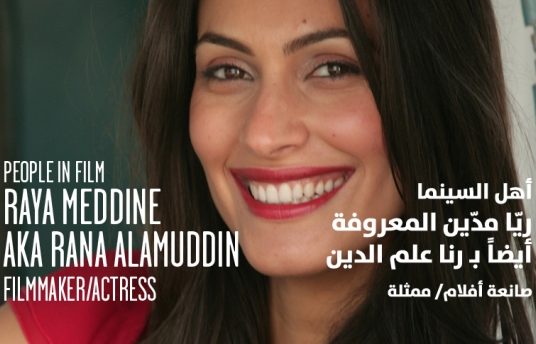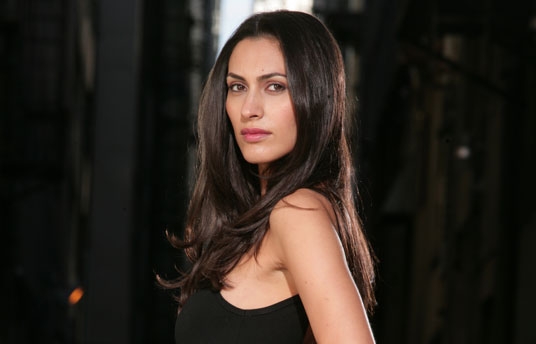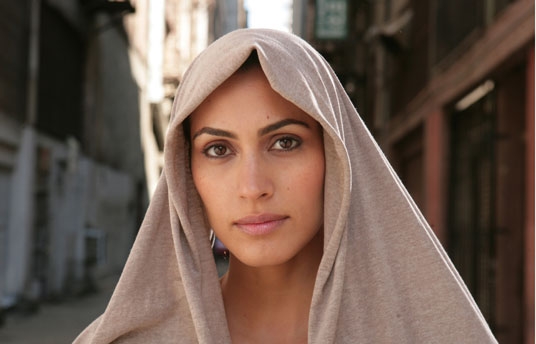People in Film: Raya Meddine aka Rana Alamuddin
Dec 13, 2011

Her latest projects include a part in the pop-cult film “Sex and the City 2”, a series regular role on the TV drama “The Young and the Restless” and performances in “CSI: Miami, Rizzoli & Isles” and Fox’s new television show “Touch” starring Kiefer Sutherland.
She’s hosted the popular pan-Arab show “Mission Fashion” and has appeared in Lebanon’s first box-office success “Bosta”. She also played the female lead in Nidal Achkar’s critically acclaimed play “To Hell with Meryl Streep” in both Beirut and Paris.
Raya Meddine, who was born Rana Alamuddin, is cultural ambassador for the Levantine Cultural Center in Los Angeles, helping raise awareness, shatter stereotypes and bridge gaps between the U.S and the Middle East through art and the entertainment industry.
Her first screenplay, “Burkawoman”, is currently being considered for the Sundance Institute’s upcoming Screenwriter’s Lab.
Meddine has lived in eight different countries and is fluent in five languages.
She is proud to identify herself as both an Arab artist and a citizen of the world.
DFI: We are sure that many upcoming actresses from the Middle East are eager to know how you ended up playing roles in Hollywood? How did it start?
Raya: I was living in Lebanon and working at Orbit TV as a host, reporter and writer but didn’t feel fulfilled. I dreamt of moving to Hollywood to pursue an acting career but felt it was too big and ambitious and that I just had to accept it would never happen. It was my fiance, Elie Karam, who is now my husband, that encouraged me to follow my heart. He told me to pack my suitcases and said that he would book my ticket and support me in every way, even if that meant missing me terribly while we were continents apart. I moved to L.A and worked really hard. Hollywood is a system and unless you have big connections you need to start humbly like everyone else. I took classes, rehearsed, auditioned for small projects, got my screen actors guild card, got a manager and an agent. I started building my career and my contacts. But most importantly, I started discovering who I am and that I don’t believe in giving up.
DFI: That sounds like an exhausting but fascinating journey. As an American Arab, did you face any challenges in getting parts and how did you overcome being stereotyped?
Raya: I first moved to L.A in 2002, so 9/11 was still very fresh. A lack of knowledge and therefore fear of the ‘other’ prevailed. The only roles for Arab actors in Hollywood were literally either the terrorist or the oppressed veiled woman. I decided to try an experiment: I changed my real name Rana Alamuddin to my screen name Raya Meddine. When casting directors, directors and producers saw that my name was exotic but not specific to one ethnicity, I got diverse jobs from playing a French-Italian woman, Arab roles and I even played a purely American woman on CSI: Miami. I am not advocating aspiring Arab actors to change their names at all, though. It makes me feel sad and completely schizophrenic to have had to change mine but I feel I made the right choice for the socio-political context I was in.
Now, thankfully, there’s more awareness and curiosity about Arabs in Hollywood and I don’t think that a name change is needed anymore. Also, because of my look and the fact that I speak Spanish, I was going out on Latina roles. Rana means frog in Spanish, so you can imagine how unglamorous it was to walk into an audition knowing that. As far as surpassing stereotypes I also work as cultural ambassador to a wonderful foundation based in L.A called the Levantine Cultural Center which mission is to shatter Middle Eastern stereotypes in the US through the arts and entertainment.

DFI: How do you describe your experience acting in “Sex and the City 2”?
Raya: It was simply magical. I was a huge fan of the series. I watched every episode of every season and knew a lot of the dialogue by heart. It’s a pop-culture phenomenon of iconic stature that transcends fashion. It has broken through boundaries, opened minds and empowered men and women. I spent three weeks in Morocco with the girls and the team and it was simply heaven. They were wonderful, especially Sarah Jessica and Kim. SJ is the humblest, kindest girl in the world and Kim is the incarnation of sophistication and elegance. The director and producer are also gentlemen and easily the most creative and generous people I’ve met. I know there has been a lot of controversy around SATC2 and that some Arabs found the film to be offensive. When I was offered the part of Annesha, I had only read my scene. The full script wasn’t available for confidentiality reasons. I thought the part was witty, humorous and portrayed Arab women as proud of our heritage but also open to Western culture; as elegant yet playful, as strong yet feminine. I had the best time shooting it.
DFI: Do you feel that actors from the Middle East have more chances of appearing in the international arena? Where is the best place to start?
Raya: Middle Eastern actors are already making their mark. The next ten years are going to be stellar for Middle Eastern actors and filmmakers. We’re on our way to the peak of our creativity, humanity, artistic expression and confidence in our uniqueness. We are supported by burgeoning regional festivals, patrons of the arts and foundations and are being followed as well by international tastemakers and investors.
As for the best place to start, unfortunately there isn’t a ready-made formula. Each individual is different and needs to find his own truth and unique path. Half the battle is discovering who you truly are and what you truly want. In my case, I left Beirut in 2002 when there was no Lebanese cinema, moved to Hollywood and starting working there. Now, I’m spending more and more time in the Middle East because I have a thirst for real stories, causes and voices from my part of the world. I have things to say that I cannot say in Hollywood. The key, whether in the Middle East or Hollywood, is to know what you want and generate your own projects instead of waiting for people to offer you jobs.
DFI: You also acted in “Bosta”, a Lebanese film and hosted a TV show. Do you have other Arab-speaking projects in the future?
Raya: “Bosta” was my first feature film in Arabic and when I hosted the Pan-Arab TV show “Mission Fashion”, I had to read a tele-prompter in Arabic, “live” in front of millions of viewers and I had never studied Arabic. One of my next Arabic projects is “Burka Woman”, a movie I wrote and will be acting in. It’s about an Arab female action hero. Now that I split my time between Los Angeles and the Middle East, I’m meeting talented writers and filmmakers and am looking forward to working on meaningful films that reflect my voice as an Arab woman and artist. I’m very open to working in Arabic and supporting Arab cinema.

DFI: How do you manage between your role as a filmmaker, actress and a mother?
Raya: It can be a challenge but it’s also an opportunity to discover what matters to you and focus on it. I’ve been extremely fortunate because I’ve had a lot of help and support. Up until my baby was six months old I was able to act on a new show, write my screenplay and contribute to the causes that mean a great deal to me like Women’s Voices Now, a festival for Muslim women filmmakers. But many times I’m also confronted with having to make peace with the fact that everything is not always all about me and that my baby’s well-being and the harmony of our little family is more important than my narcissistic needs. It’s a dance, you try to keep a balance and enjoy the cycles and the changes.
DFI: How has Arab cinema evolved over the last few years?
Raya: Arab cinema has made a remarkable leap and I see it entering an upcoming renaissance. More and more Arab filmmakers are diving head first in their personal and creative expression without fear of how they will be judged, censored or perceived. There is a lot of visual beauty, raw poetry but also important issues and causes being unearthed. The best is yet to come and I’m very excited we all get to be part of it.
DFI: You attended this year’s Doha Tribeca Film Festival. What were your highlights?
Raya: I loved Khaled Al-Hagar’s movie “El Shoq” (Lust) in which I discovered my new favorite Arab actress Sawsan Badr. I enjoyed seeing some old friends, making new ones and feeling the pulse of Arab cinema today. I was proud of the festival for living up to its image.
DFI: What is your message to ambitious young actors from the region?
Raya: Know who you are… You should pursue acting for the right reasons, not for fame and fortune or you will be miserable. Seek out to better yourself as a human being on all levels: spiritually, emotionally, culturally, and intellectually. Living fully will make you a better actor. Break free from fear. It’s an illusion, generated from your own mind and will be your worst enemy if you don’t free yourself from it.
DFI: What inspires you the most?
Raya: I am deeply inspired and moved when I’m in a state of lucid trance. Whether it’s a trance that comes from writing, dancing, meditating, praying or being completely in the moment as an actress. Music inspires me. The non-violent Palestinian struggle for justice and dignity inspires me. Looking at my baby daughter’s face and thinking who are you and where did you come from inspires me. Street artists who sneak out at night to do their murals not seeking any recognition or accolades inspire me.